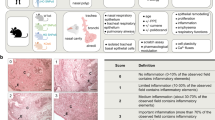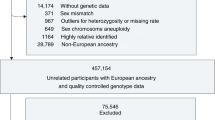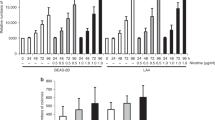Abstract
That bronchial carcinoma is not an inevitable consequence of cigarette smoking has stimulated the search for host factors that might influence the susceptibility of the individual smoker. One plausible host factor would be a polymorphic gene controlling the metabolic oxidative activation of chemical carcinogens, giving rise to wide inter-subject variation in the generation of cancer-inducing and/or promoting species. Recently, three genetic polymorphisms of human metabolic oxidation have been demonstrated (as characterized by debrisoquine, mephenytoin and carbocysteine), with the metabolism of several substrates exhibiting the phenomenon1–3. Debrisoquine 4-hydroxylation segregates into two human phenotypes, each comprising characteristic metabolic capability4–6. We report here the frequency of debrisoquine 4-hydroxylation phenotypes in age-, sex- and smoking history-matched bronchial carcinoma and control patients. Cancer patients showed a preponderance of probable homozygous dominant extensive metabolizers (78.8%) with few recessive poor metabolizers (1.6%) compared with smoking controls (27.8% and 9.0% respectively). We conclude that the gene controlling debrisoquine 4-hydroxylation may be a host genetic determinant of susceptibility to lung cancer in smokers and that it represents a marker to assist in assessing individual risk.
This is a preview of subscription content, access via your institution
Access options
Subscribe to this journal
Receive 51 print issues and online access
$199.00 per year
only $3.90 per issue
Buy this article
- Purchase on Springer Link
- Instant access to full article PDF
Prices may be subject to local taxes which are calculated during checkout
Similar content being viewed by others
References
Idle, J. R. in BIMR Clinical Pharmacology and Therapeutics Vol. 2 (eds Rawlins, M. D. & Wilkinson, G. R.) (Butterworth, London, in the press).
Smith, R. L. & Idle, J. R. in Drug Reactions and the Liver (eds Davis, M., Treger, J. M. & Williams, R.) 95–104 (Pitman Medical, London, 1981).
Eichelbaum, M. Clin. Pharmacokinet. 7, 1–22 (1982).
Mahgoub, A., Idle, J. R., Dring, L. G., Lancaster, R. & Smith, R. L. Lancet ii, 584–586 (1977).
Price Evans, D. A., Mahgoub, A., Sloan, T. P., Idle, J. R. & Smith, R. L. J. med. Genet. 17, 102–105 (1980).
Price Evans, D. A. et al. J. med. Genet. 20, 321–329 (1983).
Idle, J. R. et al. Br. J. clin. Pharmac. 7, 257–266 (1979).
Lauthier, P. et al. Alcoholism (in the press).
Kouri, R. E. et al. Cancer Res. 42, 5030–5037 (1982).
Author information
Authors and Affiliations
Rights and permissions
About this article
Cite this article
Ayesh, R., Idle, J., Ritchie, J. et al. Metabolic oxidation phenotypes as markers for susceptibility to lung cancer. Nature 312, 169–170 (1984). https://doi.org/10.1038/312169a0
Received:
Accepted:
Issue Date:
DOI: https://doi.org/10.1038/312169a0
This article is cited by
-
Finding biomarkers for non-small cell lung cancer diagnosis and prognosis
Frontiers in Biology (2012)
-
CYP2D6*4 allele and breast cancer risk: Is there any association?
Clinical and Translational Oncology (2012)
-
Pharmacogenetics: data, concepts and tools to improve drug discovery and drug treatment
European Journal of Clinical Pharmacology (2008)
Comments
By submitting a comment you agree to abide by our Terms and Community Guidelines. If you find something abusive or that does not comply with our terms or guidelines please flag it as inappropriate.



